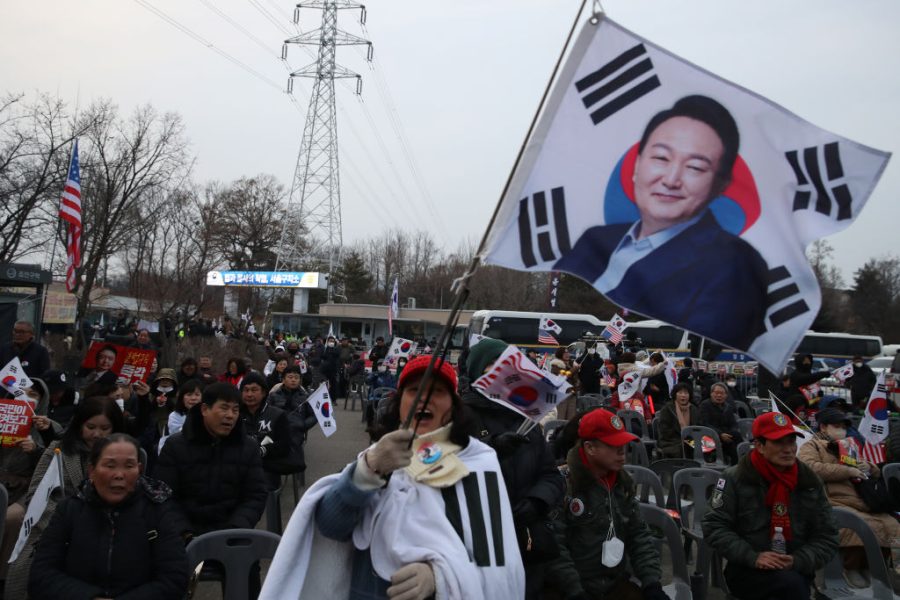It is now only a matter of days before the 52 million-strong population in South Korea will know the fate of their suspended president, Yoon Suk Yeol. Since his first impeachment hearing at the end of 2024, after which he was arrested and indicted on charges of insurrection, the President has continued to defend his initial decision to impose martial law on the evening of 3 December. But with less than a week to go before the country’s constitutional court rules on his destiny, a central court in Seoul today ordered Yoon’s release from jail, a month after his initial detention. While this is a small victory for Yoon and his team, time will tell whether the cost was worth it.
If Yoon is ousted, a snap general election must be called within sixty days
The past few weeks and months have seen Seoul become a hotbed of protests in support of and against the South Korean President, who faces two charges. The first, an impeachment trial, is investigating whether, among other things, the President violated the South Korean constitution by declaring martial law. The second is a criminal charge on the grounds of inciting insurrection and abuse of power, for which he could face life imprisonment.
On Saturday, Seoul saw the largest protests yet in support of President Yoon. The timing was hardly coincidental. The day, 1 March, marks a historic moment in Korean politics, harking back to the famous 1 March movement of 1919, in which protests swept across the then-unified Korea calling for independence from Japanese colonial rule. 106 years later, over 100,000 people gathered in the capital’s central districts and near the National Assembly building in Yeouido, opposing Yoon’s impeachment. Some brandished banners highlighting their support for his declaration of martial law, while others waved South Korean and US flags, the latter likely referring to Yoon’s foreign policy overtures in strengthening South Korea’s alliance with the United States.
Interestingly, over 2,500 college students participated in these pro-Yoon protests, thwarting claims that a conservative party lacks the appeal of the youth. But in what was another stark reminder of the deeply polarised nature of South Korean politics and society, a counter-protest led by the Democratic party – the country’s main opposition – saw tens of thousands calling for Yoon’s ousting. Many of Yoon’s opponents have spent the past few months going to great lengths to try and remove a man they simply cannot stand, and the gulf between his supporters and detractors is widening.
Nevertheless, the repeated calls for Yoon’s arrest and imprisonment, as well as the detention of his security service on the grounds of blocking authorities for executing the initial arrest warrant, are backfiring. Doing their utmost to undermine their political opposition – including through nefarious means – is an unwise political strategy.
The President’s approval ratings, which reached a nadir of 11 per cent in December last year, have risen to nearly 50 per cent. Support for the ruling People Power party amounts to nearly 44 per cent, in contrast to approximately 37 per cent for the opposition. It seems clear: if Yoon is removed from power, support for him and his party is unlikely to plummet.
A heightened police presence is already being planned in Seoul for the day of the constitutional court’s verdict. Schools in the vicinity are likely to close out of fear of violence. Whilst Yoon’s fate lies in the hands of the eight judges on the constitutional court, there will be considerable discontent on the other side whichever way things go.
Prior to the final hearing of his impeachment trial, Yoon’s lawyer deemed the investigations into his client as epitomising a ‘reality where illegality compounds illegality’. This has been a mantra of Yoon and his supporters throughout the impeachment process. For Yoon, his unprecedented declaration of martial law was meant to ‘alert the public to the national crisis caused by the legislative dictatorship of the dominant opposition party’. Whilst Article 77 of the South Korean constitution makes clear how a declaration martial law by the South Korean president is anything but illegal, was that December day really a ‘time of war, armed conflict or similar national emergency’, under which the imposition of martial law is allowed? It is very difficult to make such a case.
If Yoon is ousted, a snap general election must be called within sixty days. Should the leftist opposition – led by the anything but squeaky-clean Lee Jae-myung – emerge victorious, then South Korea’s foreign policy will change for the worse. Earlier today, South Korea and the US suspended military aircraft drills after the South’s fighter jets accidentally bombed a civilian area.
These exercises come at a time when South Korea finds itself in an increasingly precarious security environment amidst heightened cooperation between North Korea and Russia, increasing aggression from China, and as Pyongyang ramps up its provocative rhetoric towards Washington and Seoul. Whether Yoon is removed from power or not, any administration in Seoul will need to work with the Trump administration in Washington at a time of global uncertainty, not least with respect to the war in Ukraine, in which South Korea’s interests are anything but peripheral.
To those who say that democracy in South Korea is breaking down, we must remember that due process is being followed. For now, we must wait and see as to what awaits. In the meantime, South Korean citizens would do well, in this season of Lent, to reflect: is a leftist government really the best option moving forward?







Comments